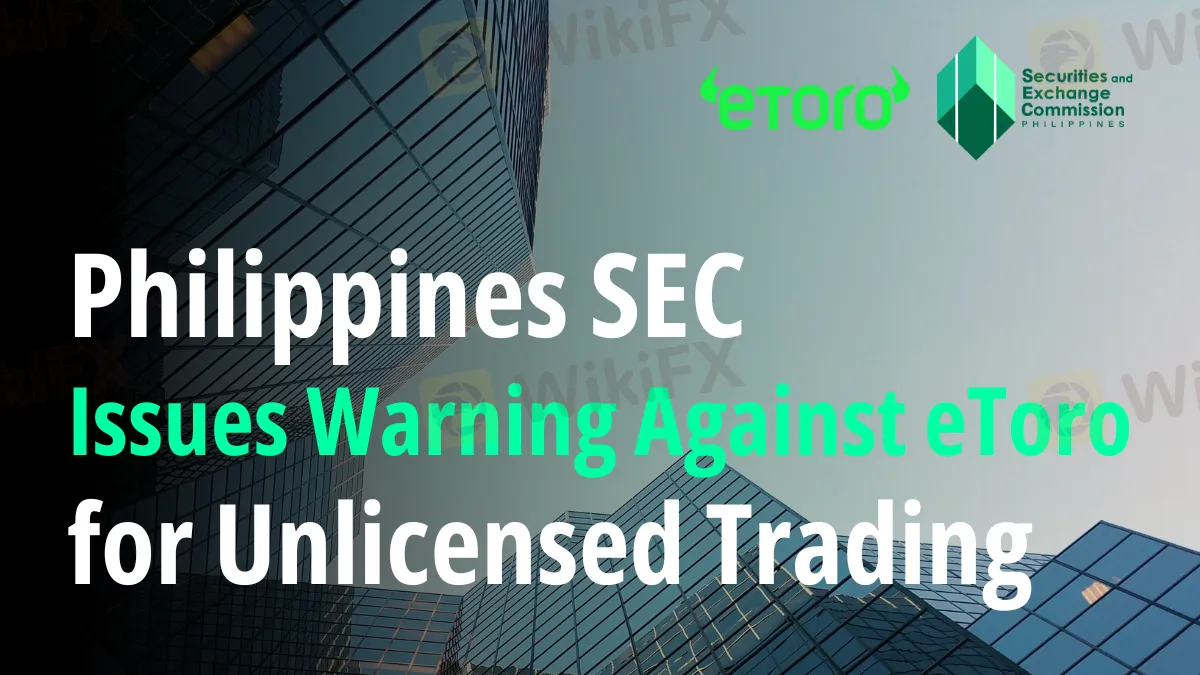简体中文
繁體中文
English
Pусский
日本語
ภาษาไทย
Tiếng Việt
Bahasa Indonesia
Español
हिन्दी
Filippiiniläinen
Français
Deutsch
Português
Türkçe
한국어
العربية
Philippines SEC Issues Warning Against eToro for Unlicensed Trading
Abstract:The PH SEC warns against eToro for unlicensed trading, underlining a broader crackdown on unregulated financial platforms like Binance.

The Securities and Exchange Commission (SEC) of the Philippines warned Filipinos to stay away from the renowned eToro market. These warnings concerning unregulated financial activities and local investor protection are spreading. Binance, a major cryptocurrency exchange globally, was also subject to a similar embargo, suggesting a wider regulatory sweep in the industry, and the steps taken against eToro by the Philippine SEC followed suit.
The SEC's allegation that eToro has been trading securities in the Philippines without the necessary licenses is in question. An article that became public on April 4th was published in March and states that eToro allegedly enabled Filipino users to trade and invest in unregistered investment products on its platform. E-Toro does not have the legal status of a company in the nation and does not have the licenses or power required by the Securities Regulation Code, according to the statement from the board. All the necessary authorizations to sell stocks, operate as a broker-dealer, or administer a securities exchange in the Philippines are included.

Since 2007, eToro has dominated its business, attracting a large user base, mainly young people. The website has around 33 million users in 140 countries. In 2023, eToro was valued at $3.5 billion, highlighting its global investment trading influence. Despite its worldwide success, the firm faced a regulatory roadblock in the Philippines.
Concerning unregistered online investing platforms like eToro, the recommendation from the Philippine SEC issued a strong warning to the general public, encouraging them to be wary. Furthermore, the guidance highlighted the severe legal ramifications that anyone in the country who serves as an agent, marketer, influencer, or seller for eToro may encounter. Showing the government's determination to safeguard its residents from potentially dangerous, uncontrolled investments, violations of the securities laws might result in heavy penalties of up to 5 million Philippine pesos (about $88,300) or up to 21 years in jail.
The official website of eToro still lists the Philippines as a supported nation, even though the SEC has issued advice against it. It might confuse prospective customers from the Philippines. Although Cointelegraph attempted to get a statement from the trading platform about these claims, they could not give any instant confirmation.
The Philippine government is clamping down on cryptocurrencies and trading platforms that do not have the proper licenses via a series of regulatory steps. The National Telecommunications Commission (NTC) of the Philippines started banning the websites of unauthorized bitcoin businesses in early March to stop them from operating. The Securities and Exchange Commission (SEC) issued an order for national internet providers to cut off their connection to Binance and similar platforms, citing potential risks to the funds of Filipino investors.
Related news:
The recent actions taken by the Philippine SEC against eToro and Binance are indicative of a worldwide trend toward tightening regulatory oversight of digital currency and online trading platforms. Global regulatory agencies are responding to the changing digital financial ecosystem by bolstering investor protection and monetary stability measures, with the significance of adhering to local legal frameworks.

Disclaimer:
The views in this article only represent the author's personal views, and do not constitute investment advice on this platform. This platform does not guarantee the accuracy, completeness and timeliness of the information in the article, and will not be liable for any loss caused by the use of or reliance on the information in the article.
Read more

The Hidden Checklist: Five Unconventional Steps to Vet Your Broker
Forex broker scams continue to evolve, employing new tactics to appear credible and mislead unsuspecting traders. Identifying these fraudulent schemes requires vigilance and strategies beyond the usual advice. Here are five effective methods to help traders assess the legitimacy of a forex broker and avoid potential pitfalls.

Doo Financial Obtains Licenses in BVI and Cayman Islands
Doo Financial, a subsidiary of Singapore-based Doo Group, has expanded its regulatory footprint by securing new offshore licenses from the British Virgin Islands Financial Services Commission (BVI FSC) and the Cayman Islands Monetary Authority (CIMA).

CFI’s New Initiative Aims to Promote Transparency in Trading
A new programme has been launched by CFI to address the growing need for transparency and awareness in online trading. Named “Trading Transparency+: Empowering Awareness and Clarity in Trading,” the initiative seeks to combat misinformation and equip individuals with resources to evaluate whether trading aligns with their financial goals and circumstances.

Malaysian-Thai Fraud Syndicate Dismantled, Millions in Losses Reported
The Royal Malaysia Police (PDRM) has received 26 reports concerning the Nicshare and CommonApps investment schemes, both linked to a major fraudulent syndicate led by a Malaysian citizen. The syndicate’s activities came to light following the arrest of its leader by Thai authorities on 16 December.
WikiFX Broker
Latest News
ASIC Sues Binance Australia Derivatives for Misclassifying Retail Clients
WikiFX Review: Is FxPro Reliable?
Malaysian-Thai Fraud Syndicate Dismantled, Millions in Losses Reported
Trading frauds topped the list of scams in India- Report Reveals
AIMS Broker Review
The Hidden Checklist: Five Unconventional Steps to Vet Your Broker
YAMARKETS' Jingle Bells Christmas Offer!
WikiFX Review: Something You Need to Know About Markets4you
Revolut Leads UK Neobanks in the Digital Banking Revolution
Fusion Markets: Safe Choice or Scam to Avoid?
Currency Calculator



